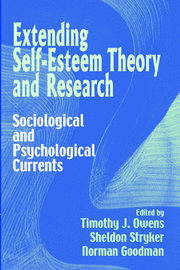Book contents
- Frontmatter
- Contents
- List of Contributors
- SECTION ONE THE FRAME
- SECTION TWO CONCEPTUAL AND METHODOLOGICAL ISSUES
- SECTION THREE SOCIAL AND LIFE COURSE CONTEXTS OF SELF-ESTEEM
- SECTION FOUR SELF-ESTEEM AND SOCIAL INEQUALITIES
- 11 Self-Esteem and Race
- 12 Gender and Self-Esteem: Narrative and Efficacy in the Negotiation of Structural Factors
- 13 Bereavement and the Loss of Mattering
- 14 Self-Esteem and Social Inequality
- 15 Self-Evaluation and Stratification Beliefs
- SECTION FIVE SELF-ESTEEM AND SOCIAL PROBLEMS
- Index
14 - Self-Esteem and Social Inequality
Published online by Cambridge University Press: 24 November 2009
- Frontmatter
- Contents
- List of Contributors
- SECTION ONE THE FRAME
- SECTION TWO CONCEPTUAL AND METHODOLOGICAL ISSUES
- SECTION THREE SOCIAL AND LIFE COURSE CONTEXTS OF SELF-ESTEEM
- SECTION FOUR SELF-ESTEEM AND SOCIAL INEQUALITIES
- 11 Self-Esteem and Race
- 12 Gender and Self-Esteem: Narrative and Efficacy in the Negotiation of Structural Factors
- 13 Bereavement and the Loss of Mattering
- 14 Self-Esteem and Social Inequality
- 15 Self-Evaluation and Stratification Beliefs
- SECTION FIVE SELF-ESTEEM AND SOCIAL PROBLEMS
- Index
Summary
SOCIAL INEQUALITY AND SELF-ESTEEM
The relationship between social inequality and self-esteem is an issue of great concern in a society that embraces egalitarian ideals. The issue reflects a troubling question about whether societal systems of inequality and hierarchy subvert valued assumptions that, although considerable differences in ability, appearance, resources, and social station will exist in every society, people are nonetheless equal in the pursuit of happiness and personal wellbeing. Because the connection between self-esteem and psychological wellbeing seems both intuitively and empirically well grounded (e.g., Mecca, Smelser, & Vasconcellos, 1989; Mruk, 1995; Rosenberg, 1979; Wylie, 1979), the impact of social stratification on self-esteem becomes a central concern. Seemingly, if social inequalities strongly shape an individual's sense of selfidentity and self-regard, and do so in ways that are derogatory, then the egalitarian assumption is invalid, and democratic systems of social and political organization based on it become deceptions or delusions – a very disquieting prospect.
Correspondingly, over the past half century, we have accumulated a considerable amount of empirical research and scholarly analysis concerning the relationship between social inequality and self-esteem. This includes hundreds, if not thousands, of publications, a number that continues to grow up through the present time. What then does this body of research and scholarship reveal about the critical relationship between self-esteem and social inequality? Does it confirm that the social structures of status and privilege determine the individual's self-identify, self-regard, and prospects for success and happiness? Can we systematically and empirically answer this troubling question?
Information
- Type
- Chapter
- Information
- Extending Self-Esteem Theory and ResearchSociological and Psychological Currents, pp. 301 - 329Publisher: Cambridge University PressPrint publication year: 2001
Accessibility standard: Unknown
Why this information is here
This section outlines the accessibility features of this content - including support for screen readers, full keyboard navigation and high-contrast display options. This may not be relevant for you.Accessibility Information
- 7
- Cited by
